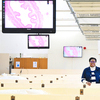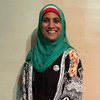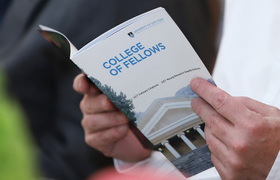VC’s challenge to new UCT Fellows
10 November 2021 | Story Helen Swingler. Photos Robyn Walker. Video Director Rozanne Engel. Video Oatmeal Productions. Read time 9 min.“You are the university’s elders,” University of Cape Town (UCT) Vice-Chancellor Professor Mamokgethi Phakeng said in her address to welcome nine inductees to the UCT College of Fellows on 3 November. Her two challenges to the inductees centred on the university’s Vision 2030 and its massive transformative purpose to unleash human potential for a fair and just society.
Speaking at the event, held at the Norval Foundation Art Gallery, Professor Phakeng asked the UCT College of Fellows to consider what Vision 2030 and its pillars of excellence, transformation and sustainability meant to them as senior, world-renowned scholars – and how would it shape their thinking and contributions.
UCT Fellowships recognise members of permanent academic staff for original and distinguished academic work that merits special recognition. Induction into the College of Fellows is one of the highest accolades an academic staff member can receive at the university.
The nine new UCT Fellows are:
- Professor Joan Hambidge (School of Languages & Literatures)
- Professor Nicola Illing (Department of Molecular and Cell Biology)
- Professor Hanri Mostert (Department of Private Law)
- Professor Mpiko Ntsekhe (Department of Medicine)
- Professor Ntobeko Ntusi (Department of Medicine)
- Professor Karen Sliwa-Hahnle (Cape Heart Institute)
- Professor Michael Claeys (Department of Chemical Engineering)
- Professor Francis Nyamnjoh (School of African and Gender Studies)
- Professor Fiona Ross (School of African and Gender Studies)
The event was co-hosted by Deputy Vice-Chancellor (Research and Internationalisation) Professor Sue Harrison. UCT Fellow Professor Raj Ramesar of the Faculty of Health Sciences introduced each of the new Fellows, who were asked to speak briefly about their academic journeys and reflect on their work.
Necessary disruption
While the events following the student-led protests in 2015 and the onset of the pandemic in 2020 had ushered in “years of discomfort and disruption” at UCT, that disruption had served to forge Vision 2030, Phakeng said.
“When we introduced Vision 2030 at the end of 2019 during the university’s Research Symposium, I said that if we did not disrupt ourselves, we would be disrupted.
“[The events following 2015] were a stroke of luck because, in my view, we needed a bit of disruption to think outside ourselves … And in many ways 2020 got us to do things differently. As a top performing university, it is very easy for UCT to be comfortable and continue doing the same things.”
Phakeng said the College of Fellows had some thinking and work to do in terms of Vision 2030.
On the pillar of excellence, she said excellence would remain a non-negotiable in UCT’s future.
“We’re reminded of the many ways we value excellence; we have this group of internationally revered scholars who’ve done groundbreaking work ... But excellence is complex. It can marginalise and silence; it is not always benign. So how do we pursue excellence, encourage it and grow it while becoming aware of its complexities?”
One way to manage that would be through the pillar of transformation.
“We need elders who will ask: What is it changing? What is it shaping? Is it for a fair and just society?”
“This [transformation] reminds us of the kind of world we live in; an unequal, unfair, sometimes brutal world of wounded people … I want to argue that as the College of Fellows the pillar of transformation should force us to ask different questions about excellence.”
Here Phakeng referred to Chris Brink’s book, The Soul of a University: Why excellence is not enough. In it the author asks hard questions about the role of universities in society, beyond academic excellence. That role, Brink argues, is about societal challenges and promoting social change.
The Vice-Chancellor said, “You as elders are committed to excellence but we need elders who will ask: What is it changing? What is it shaping? Is it for a fair and just society? If we don’t ask those questions, we won’t be sustainable.”
Four new College of Fellows Young Researcher Awards. (Absent Assoc Prof Christopher Ouma.)
Transformation with integrity
In terms of transformation, Phakeng underscored UCT’s commitment to “transformation with integrity”.
“I don’t believe in transformation that’s only interested in the amount of melanin in the skin. I don’t think having the right amount of melanin in your skin delivers anything. We require people to be able to put things on the table: what they’re able to do, what they have achieved, and what we can achieve …”
UCT’s Vision2030 strives to enable excellence through diversity, which would, in turn, enable
sustainability, she said.
“As a global university we can’t expect that our transformation agenda means we hire, for example, only people from Cape Town, or only from South Africa or only from the African continent. We are interested in talent. Of course, we must understand the inequities of the past, we must build capacity and potential where we see it. And we must look for talent elsewhere [too].”
Supporting healthy structures
Phakeng also challenged the College of Fellows to ask questions about the health of university structures such as Senate, its most influential academic body.
“UCT needs a strong, participative Senate where all views are heard and recognised. The strength of the university depends on a strong Senate.”
She added, “It’s not a rubber stamp. It’s a place of engagement. You are the elders of the university and we need the voice of the Fellows. I hope as we move ahead that you’ll keep us in check and ask the important questions that will make us stronger.
“Universities are great only because of their people.”
UCT Fellows in training
The occasion was also an opportunity to congratulate four new College of Fellows Young Researcher awardees. These awards recognise outstanding scholarly work by young academics who have made significant independent contributions to research in their field.
They are:
- Lauren Kohn (Public Law)
- Dr George Mahashe (Michaelis School of Fine Art)
- Associate Professor Christopher Ouma (English Literary Studies)
- Associate Professor Amir Patel (Electrical Engineering)
“The reason we want young Fellows like you to be successful is because we want this room to be full of you in the next 10 to 15 years.”
Phakeng said, “When I took office, I introduced the 2030 Future Leaders Programme. We select these future leaders on merit, either because they have a National Research Foundation P-rating or they have won the Young Researcher Award. The idea is to get them to stay successful – and stay at UCT.
“The amazing thing is how representative this group is when they are selected on merit and not demography. The majority are women, but they come from everywhere. They are bright, they love the university and are committed to being successful here.”
She added, “The reason we want young Fellows like you to be successful is because we want this room to be full of you in the next 10 to 15 years or so. We want this kind of excellence to continue. And so, my hope is that we’ll see you there.”
 This work is licensed under a Creative Commons Attribution-NoDerivatives 4.0 International License.
This work is licensed under a Creative Commons Attribution-NoDerivatives 4.0 International License.
Please view the republishing articles page for more information.














